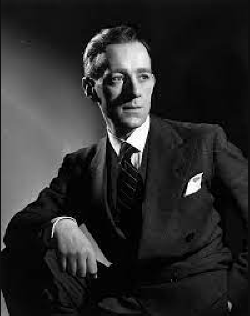

Queer Places:
155 Lauderdale Mansions, Lauderdale Road, Maida Vale W9 1LY, UK
The
Brook, Stamford Brook Road, Chiswick W6 0XJ, UK
7 St Peter's Square, Hammersmith W6 9AB, UK
Kettlebrook Meadows, Steep Marsh, Petersfield GU32 2BD, UK
Petersfield Cemetery
Petersfield, East Hampshire District, Hampshire, England
 Sir Alec Guinness CH CBE (born Alec Guinness de Cuffe; 2 April 1914 – 5 August 2000) was an English actor.
Sir Alec Guinness CH CBE (born Alec Guinness de Cuffe; 2 April 1914 – 5 August 2000) was an English actor.
Guinness married the artist, playwright, and actress Merula Silvia Salaman (1914–2000) in 1938; in 1940, they had a son, Matthew Guinness, who later became an actor. From the 1950s the family lived at Kettlebrook Meadows, near Steep Marsh in Hampshire. The house itself was designed by Merula's brother Eusty Salaman.[50][51]
In his biography, Alec Guinness: The Unknown, Garry O'Connor reports that Guinness was arrested and fined 10 guineas (£10.50) for a homosexual act in a public lavatory in Liverpool in 1946. Guinness is said to have avoided publicity by giving his name to police and court as "Herbert Pocket", the name of the character he played in Great Expectations. However, no record of any arrest has ever been found. Piers Paul Read, in his 2005 biography, suggests "The rumour is possibly a conflation of stories about Alec's 'cottaging' and the arrest of John Gielgud, in October 1953, in a public lavatory in Chelsea after dining with the Guinnesses at St. Peter's Square."[53] This suggestion was not made until April 2001, eight months after his death, when a BBC Showbiz article related that new books claimed that Guinness was bisexual and that he had kept his sexuality private from the public eye and that the biography further said only his closest friends and family members knew he had sexual relationships with men.[54]
After an early career on the stage, Guinness was featured in several of the Ealing Comedies, including Kind Hearts and Coronets (1949), in which he played nine different characters, The Lavender Hill Mob (1951), for which he received his first Academy Award nomination, and The Ladykillers (1955). He collaborated six times with director David Lean: Herbert Pocket in Great Expectations (1946), Fagin in Oliver Twist (1948), Col. Nicholson in The Bridge on the River Kwai (1957, for which he won the Academy Award for Best Actor and the BAFTA Award for Best Actor), Prince Faisal in Lawrence of Arabia (1962), General Yevgraf Zhivago in Doctor Zhivago (1965), and Professor Godbole in A Passage to India (1984).

Sir Alec Guinness by Allan Warren

Sir Alec Guinness; Simon Ward
by Lewis Morley
toned bromide print, 1967
11 1/8 in. x 14 1/2 in. (283 mm x 369 mm)
Given by Lewis Morley, 1989
Photographs Collection
NPG x125185
While serving in the Royal Navy, Guinness had planned to become an Anglican priest. In 1954, while he was filming Father Brown in Burgundy, Guinness, who was in costume as a Catholic priest, was mistaken for a real priest by a local child. Guinness was far from fluent in French, and the child apparently did not notice that Guinness did not understand him but took his hand and chattered while the two strolled; the child then waved and trotted off.[55] The confidence and affection the clerical attire appeared to inspire in the boy left a deep impression on the actor.[56] When their son was ill with polio at the age of 11, Guinness began visiting a church to pray.[57] A few years later in 1956, Guinness converted to the Roman Catholic Church. His wife, who was of paternal Sephardi Jewish descent,[58] followed suit in 1957 while he was in Ceylon filming The Bridge on the River Kwai, and she informed him only after the event.[59] Every morning, Guinness recited a verse from Psalm 143, "Cause me to hear your loving kindness in the morning".[60]
In 1970 he played Jacob Marley's ghost in Ronald Neame's Scrooge. He also portrayed Obi-Wan Kenobi in George Lucas's original Star Wars trilogy; for the original 1977 film, he was nominated for Best Supporting Actor at the 50th Academy Awards. Guinness began his stage career in 1934. Two years later, at the age of 22, he played the role of Osric in Hamlet in the West End and joined the Old Vic. He continued to play Shakespearean roles throughout his career. He was one of the greatest British actors, along with Laurence Olivier and John Gielgud, who made the transition from theatre to films after the Second World War. Guinness served in the Royal Naval Reserve during the war and commanded a landing craft during the invasion of Sicily and Elba. During the war he was granted leave to appear in the stage play Flare Path about RAF Bomber Command. Guinness won an Academy Award, a BAFTA, a Golden Globe and a Tony Award. In 1959 he was knighted by Elizabeth II for services to the arts. He received a star on the Hollywood Walk of Fame in 1960, the Academy Honorary Award for lifetime achievement in 1980 and the BAFTA Academy Fellowship Award in 1989. Guinness appeared in nine films that featured in the BFI's 100 greatest British films of the 20th century, which included five of Lean's films.
Guinness died on the night of 5 August 2000 at King Edward VII's Hospital in Midhurst, West Sussex.[61][62] He had been diagnosed with prostate cancer in February 2000, and with liver cancer two days before he died, while his wife was also suffering from liver cancer.[63] He was interred at Petersfield Cemetery, Hampshire.[64]
My published books: